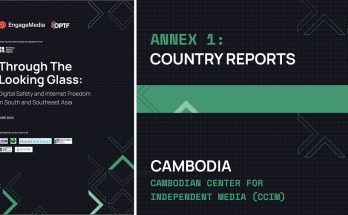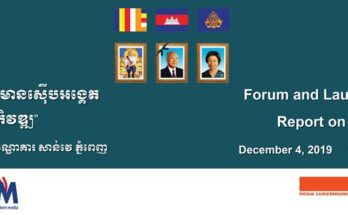 The poll finds that 55 percent of respondents still think the country is headed in the right direction, which represents a 24 point drop from the number who felt that way less than one year ago, and is the lowest figure since IRI started polling in Cambodia in 2006, according to the International Republican Institute’s survey.
The poll finds that 55 percent of respondents still think the country is headed in the right direction, which represents a 24 point drop from the number who felt that way less than one year ago, and is the lowest figure since IRI started polling in Cambodia in 2006, according to the International Republican Institute’s survey.
The poll also shows that among the main factors in deciding which party to support in the July 2013 elections, voters’ most often stated reason was, “the country needs a change.” The national survey of adults was conducted by the Center for Advanced Study based in Phnom Penh, Cambodia, and coordinated and analyzed by Public Opinion Strategies in consultation with IRI.
The Center for Advanced Study conducted face-to-face interviews October 28 – November 10, 2013, in all of the country’s 24 provinces including the capital, Phnom Penh. Respondents were a random sample of 2,000 Cambodian citizens, aged 18 and older. The margin of error for the full sample is +/-2.2 percent with an 89 percent response rate. VOD reporters have met Jessica Keegan, acting director of IRI, to talk to her about the survey.
Question: What is the purpose of the survey?
Ans: The purpose of our public opinion research survey is to provide the political parties as well as other key stakeholders in the government, as well as for our internal purpose; to inform our programs but primarily our public opinion research is used to help guide political parties in developing issue based platforms.
Question: What are the differences between this survey and previous ones?
Ans: Big difference. In this most recent survey we have obviously seen a significant shift in moods and attitudes of Cambodian people. Our survey from 2013 was conducted in January and then we conducted another survey most recently in October. It is clear that Cambodians are more discontent about the country’s direction than they were a year ago. In this survey a very small margin of people continued to think the country was headed in the right direction. This shift in mood and behavior from January 2013 to October 2013 is quite significant. It shows a strong desire for democratic reforms.
Question: What does the survey reflect the Change-result of election?
Ans: Possibly, yes. I think that there were a lot of important social political factors that have led to this survey results. There is a formal opposition, the merger of the opposition parties, the contested election results, these are things that are important in factoring into the political landscape and how it has changed from our January survey and October survey. If we just focus on our survey data, there are strong evidences in this survey results that there is a need for an electoral reform, particularly in the voter list. Having said that, the irregularities with the elections, with the way that the elections were administered, is a serious concern. When you look at the question that we asked of Cambodians, of our respondents- how concerned are they about discrepancies in the voter list- 71%, ¾ of them are concerned about this, it does show that this is an issue.
Question: How is the survey reliable?
Ans: Yes, the survey research is accurate within a plus or minus 2.2 margin of error. We are confident with the survey results and confident that the Cambodian people have spoken through this data.
Question: Represent of the whole country? Ans: Yes.
Question: Do you think that Cambodian government will consider results of survey?
Ans: I think that is up to those in power and those decision makers to accept the results or not of the survey findings. Just looking at the election results as reported by the NEC, it is clear that popular support for the ruling party is diminishing and unless those decision makers that are in a position of power to respond to the demands of their constituents, because as we can see from these survey results that the demands of the constituents in the electoral are changing, unless those that are in a position of power to adopt real democratic reforms do something to meet these needs, I think freedom of democracy will continue to erode. It is up to them to decide what to do, but ultimately the survey results indicate that something needs to be done and there is popular support for democratic reform.
Question: Does the result provide benefits for Cambodian people/government?
Ans: Generally the data indicates a strong desire for reform, for a more representative government, to fair court system to protecting freedom of speech. Sure, I think there are a lot of actionable data points in here. One important aspect of the survey is that nearly 3/4 of respondents believe that they were more free to speak publicly about politics, and much of IRI’s programs over the years have focused on the expansion of independent media, and policy debate and youth participation. As we know there was a large youth turnout in these last elections and many youth came out to vote for the first time. Coupled with the large number of people who said that they were free to speak more openly about politics I think this an encouraging thing for IRI, for others invested in democracy development here, and for the Cambodian people. It is important note, though having said that, that at the time the survey was conducted which was in October, Cambodians generally had the right to peaceful assembly, you know, at that time NGOs could screen movies without fear of criminal reprisal, human rights activists could voice their concerns without being placed in prison. I think if the survey were conducted today, the [right direction] trend line would likely be even narrower(different). Conversely, there is strong support among all Cambodians for democratic reform, particularly in the areas of judiciary and freedom of speech. In terms of consensus building in this highly polarized environment, I think the issue of judiciary and freedom of speech might be worth exploring in terms of greater dialogue between the parties.
Question: Why does VOD hot news is included on the survey?
Ans: We felt like VOD hot news, since it just launch, last year- considering the launch of the new website from last year we felt like it was important to test whether or not the VOD hot news media outlet was a place where Cambodians went to, to get their news and information, and as we can see from our survey there was a notable percentage of people who actually do get their news and information Considering there is a lack of independent media in Cambodia, so we wanted to test what are the media preferences of people to get news and information, how do they access news and information?
Question: what will IRI do next?
Ans: Well we hope to, we work with the political parties on building issue-based platforms; there is a lot of actionable data in this survey, actionable data for those who are in a position to make policy changes and reforms, actionable data for the parties to form policy platforms that are representative hopefully of the needs of the people. There is also data in here that can be used to inform out own program moving forward, which as I mentioned are focused on youth empowerment and political party strengthening. In the future we obviously hope to continue to conduct more public opinion research; it is a vital part of understanding the political climate here. It is a vital part for stakeholders to be able to use opinion research and analyze public opinion research to improve not only relationships with constituents and government services but for parties to form platforms that meet the needs of people.
Question: What are the recommendations to Cambodian government?
Ans: The data speaks for itself. We do not analyze the data for the Cambodian government. We provide stakeholders with the data and we are hopeful that they use it in a constructive way. There are very clear indicators in this survey that reforms need to be made and there is popular support for that. It is up to those in power to decide what to do. We do not provide recommendations or consultations, we work with political parties to strengthen their capacities to analyze the data and use the data on their own. So we provide them with the data but we can’t tell them what to do with it, it is up to them.
Question: Suggestions?
Ans: Well, part of the focus of our programming is to give them this data, to show how it is very valuable to tap into the needs of their constituents, so that is the point of democracy development and implementers is that we build their capacity to make these decisions, to interpret on their own and to do this on their own. This survey shows… that the interests and the needs of the Cambodian people have shifted. Political platforms that are built on personalities, rather than principles, are not enough. This indicates that we are in a polarized environment and that parties need to adapt, some parties are better at doing that than others, in adapting to the needs of the people. It is clear that popular support is for the status quo and the way that things have been done is diminishing rapidly.
By Vida Taing, Francien Boom




